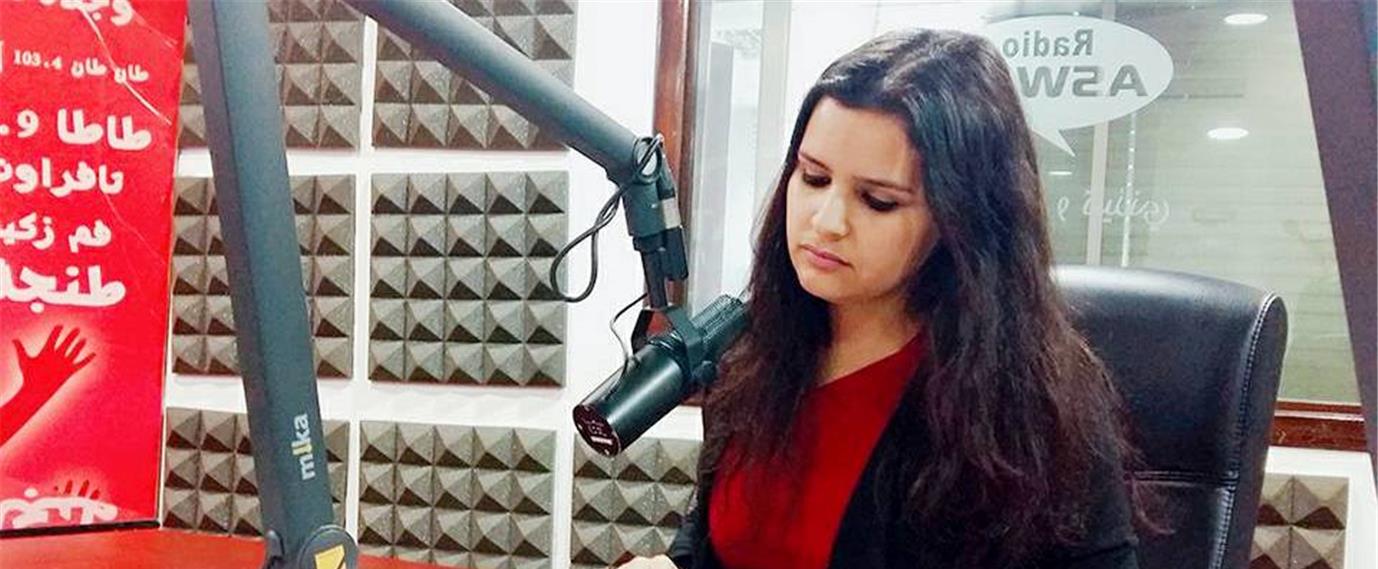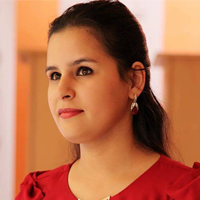على مر الزمان ظلت المساواة مع الرجل مطلبا ملحّا للمرأة المغربية على غرار نظيرتها العربية لتمكينها من كافة حقوقها الاقتصادية والسياسية والاجتماعية، لكن على النقيض من ذلك ظل المجال الإعلامي نقطة مشرقة إلى حد ما، بالنظر إلى المكتسبات التي تحققت فيه، وإن كانت المغربيات تمنين النفس بأن تفتح أمامهن آفاق رحبة أكثر.
يجمع كثيرون في المغرب على أنه تم إحراز تقدم كبير في المجال الإعلامي لفائدة المرأة المهنية، سواء على مستوى حضورها داخل المؤسسات المهنية أو على مستوى مراكز القرار التي أصبحت تحتلها في هذه المؤسسات، إلا أن كل هذا التقدم المحرز لا يرضي طموح النساء العاملات في المجال الإعلامي والحركة النسائية عموما، والتي ترى أن ما تحقق لا يرقى بعد إلى سقف طموحاتها.
تحقق القليل وما زال الكثير
لا يختلف اثنان حول التطور الذي عرفه الحضور النسائي في المشهد الإعلامي المغربي خلال السنوات الأخيرة، والأرقام المعلن عنها في هذا الباب تعد مشجعة بالنظر لما سبق، إذ أن عدد الصحفيات الحاصلات على بطاقة الصحافة المهنية التي تمنحها وزارة الاتصال في المغرب سنويا تجاوز السنة الماضية الـ630 صحفية، وهو عدد مرتفع لم يسجل خلال سنوات طويلة.
هذا التطور الملاحظ ليس على مستوى الكمّ فقط بل نوعيٌّ أيضا، إذ يلاحظ أكثر مما سبق تقلد نساء لمناصب قيادية ومسؤوليات مختلفة في مجموعة من المؤسسات الإعلامية، والأرقام في هذا الجانب تشير إلى أن عدد النساء اللواتي تقلدن مسؤولية النشر في مؤسساتهن فاق السنة الماضية الـ50 امرأة، رغم أن عدد الرجال الذين يتقلدون نفس المسؤولية يبقى كبيرا جدا إذ يناهز الـ500 مسؤول.
هذا الرقم يبقى منخفضا أيضا لدى النساء العاملات في المطبوعات والصحف الأجنبية التي يتم طبعها وتوزيعها في المغرب والتي تدير النساء قرابة 10% منها فقط.
ولا تختلف هذه المعطيات الخاصة بالمشهد الإعلامي في المغرب كثيرا عن مثيلاتها في باقي الدول العربية، وهذا ما سبق وأكدته دراسة لمنظمة الأمم المتحدة للمساواة، إذ وجدت أن حوالي 73% من المناصب الإدارية العليا في مجال الإعلام يهيمن عليها الرجال.
أما على مستوى الصحافة الإلكترونية فهناك 15 مسؤولة فقط من أصل 322 موقعا إلكترونيا تحصل على تصريح وزارة الاتصال. وهنا يمكن القول إنه مع الطفرة التي شهدتها الصحافة الإلكترونية في المغرب مؤخرا، أصبح حضور المرأة الصحفية أكثر بروزا على مستوى الإدارة، إذ تقود مجموعة من النساء تجارب ناجحة في الصحافة الإلكترونية وتشرفن على المشروع الإعلامي إشرافا تاما، وتترأسن نشره وتحريره وتدرن الفريق العامل فيه.
الإعلاميات المغربيات في مراكز القرار
توجد نماذج لافتة في المغرب لسيدات تبوأن مراكز قيادية في مؤسسات إعلامية عدة، من بينهن الصحفية ماريا لطيفي التي تترأس قناة الرابعة وهي أول امرأة تعين مديرة لقناة تلفزية مغربية، وسميرة سيطايل نائبة المدير العام للقناة الثانية المغربية ومديرة الأخبار فيها، وفاطمة البارودي مديرة الأخبار في القناة التلفزية الأولى، بالإضافة إلى أسماء نساء كثيرات استطعن الوصول إلى مناصب قيادية وبقين فيها لمدة طويلة ويشهد لهن كثيرون بتحقيق نجاحات كبيرة.
رغم ذلك، تبقى نسبة وصول المرأة إلى مراكز القرار في المؤسسات الإعلامية ضئيلة جدا كما تقول الصحفية حنان رحاب عضو المكتب التنفيذي للنقابة المغربية، مضيفة أن مناصب رئاسة التحرير في اليوميات الناطقة باللغة العربية تكاد تكون خالية من أي رئيسة تحرير أو سكرتيرة تحرير، على عكس الصحافة الناطقة باللغة بالفرنسية إذ توجد سيدات على رأس عدد من الدوريات من بينها أسبوعية "فينانس نيوز" الاقتصادية والتي تديرها سيدة وفيها رئيستا تحرير.
بالإضافة إلى ما سبق ترى رحاب أن الغبن الذي يطال الإعلاميات المغربيات برأيها لا يقتصر على ضعف وجودهن في مراكز القرار بل يشمل أيضاتنميط صورة المرأة على مستوى المسؤولية التي تعطى لها أيضا، وتوضح فكرتها بالقول إنه غالبا ما نجد امرأة تترأس تحرير مجلة نسائية تعنى بشؤون المرأة، وبالتالي فإننا نجعل قضية المرأة تهم المرأة فقط، في حين ينبغي أن يساهم الإعلام في جعل قضايا المرأة والمساواة قضايا المجتمع ككل.
من جهتها ترى بشرى المرابطي، الباحثة المتخصصة في علم الاجتماع أن حجم الحضور النسائي في المؤسسات الإعلامية يتفاوت من مؤسسة لأخرى وإن كان ضعيفا في مجمله، مضيفة أن الواقع يدلّ على أن تمكين المرأة ضعيف عموما، لكن في مقابل ذلك تؤكد على أن هناك تطورا على مستوى بروز إعلاميات كثيرات خصوصا في الإذاعة، رغم أنها تسجل غيابا شبه تام للمرأة المغربية عن البرامج السياسية والاقتصادية سواء كمهنية أو كضيفة أو متدخلة.
المرابطي التي تثمن حضور المرأة الفاعل في المشهد الإعلامي المغربي، تؤكد أن التطور الذي عرفه المشهد المغربي جعله ينفتح على الكفاءة ويتخذها معيارا أولا، لكن على الرغم من ذلك هناك مؤسسات إعلامية خصوصا في الإعلام البصري تركز على الشكل بالدرجة الأولى، إذ أن هناك من القنوات التلفزية من تتعاقد مع حسناوات لقراءة الأخبار بناء على الشكل فقط رغم توفرها على كفاءات نسائية كثيرة، وهنا تعطي المرابطي مثالا بقنوات أوروبية تظهر على شاشاتها مذيعات وإعلاميات رغم تجاوزهن سن الأربعين بكثير، في حين يتم إقصاء إعلاميات مغربيات في مثل هذه السن من الظهور على الشاشة، وحصرهن في الإعداد وكواليس العمل الإعلامي.
مسألة اللون وعدم ظهور نساء أو حتى رجال ذوي بشرة سوداء على الشاشة معطى تشير إليه بشرى المرابطي كذلك، بالإضافة إلى صعوبة ولوج الإعلاميات من ذوي الإعاقة إلى سوق العمل وكلها نقط سلبية ينبغي العمل على تجاوزها في نظر المرابطي من أجل تحسين وضعية الإعلامية المغربية ومنحها مناخا صحيا وملائما للعمل والإبداع.
مطالبات بالمساواة في الأجور
ما زالت مسألة الأجور المنخفضة لعدد من الإعلاميات في المغرب مقارنة بزملائهن الرجال مسألة شائكة ينبغي البت فيها بشكل قاطع، إذ لا مسوغ للتفاوت الكبير في الأجور بين المهنيين والمهنيات في عدد من المؤسسات، وفيما ينتفي هذا التفاوت في مؤسسات أخرى أو يكون لصالح المرأة في بعضها فإن مهنيي الإعلام في المغرب يتفقون على أن الكفاءة ينبغي أن تكون الفيصل في هذه النقطة، النقابة الوطنية للصحافة المغربية توقفت في تقاريرها الدورية مرارا عند هذا المعطى وسجلت عدة حالات تهم التباين الكبير في الأجور بين الرجل والمرأة خاصة في الصحافة المكتوبة، ودعت إلى اعتماد معايير موضوعية من أجل تحديد الأجور في المؤسسات الإعلامية وتقديم تحفيزات للإعلاميين والإعلاميات بدون استثناء أو تمييز.
مجلس النوع لدعم الإعلاميات
مساهمة منها في تشجيع الإعلاميات المغربيات ودعمه، أحدثت النقابة الوطنية للصحافة المغربية مجلس النوع الاجتماعي الذي يهتم بحضور المرأة إعلاميا ويهدف إلى دعم وصولها إلى مراكز القرار بالإضافة إلى تتبع ومراقبة الاختلالات التي تعرفها المواد الصحفية التي تتناول المرأة وقضاياها، في هذا الصدد تقول حنان رحاب عضو المكتب التنفيذي للنقابة، إن هياكل المجلس تعرف انخراط مجموعة من الصحفيات والصحفيين أيضا من أجل العمل المشترك على عدة أهداف من بينها تأهيل الإعلاميات المغربيات، وبخصوص طبيعة الوجود النسائي في هياكل النقابة تؤكد رحاب أن هناك حضورا فاعلا للمهنيات المغربيات في النقابة، ومنهن من تتبوأ مركزا قياديا مثل النائبة الأولى لرئيس النقابة وهي الصحفية بالإذاعة الوطنية ربيعة مالك، بالإضافة إلى نائبة ثانية هي فاطمة الحساني، الصحفية بوكالة المغرب العربي للأنباء، وكلتاهما انتخبتا عضوتان بالمكتب التنفيذي للنقابة، إلى جانب عضوات أخريات في المكتب تمثلن الصحافة المكتوبة والمسموعة والمرئية.
المجتمع يشجع ولكن..
التحول الذي عرفه المجتمع المغربي والمشهد الإعلامي في المغرب عموما، إضافة إلى الطفرة التكنولوجية التي مكنت المتلقي من التعرف عن كثب على المنابر الإعلامية وطواقمها والقرب منهم أكثر، ساهمت في الإقرار بقدرات المرأة في جميع المجالات ومن بينها المجال الإعلامي كما تقول الباحثة المتخصصة في علم الاجتماع بشرى المرابطي، يضاف إلى ذلك مجهودات المؤسسات العامة والمجتمع المدني الداعمة لتمكين المرأة، وتعطي المرابطي مثالا هنا بالتفاعل الكبير مع البرامج التي تقدمها إعلاميات عبر مختلف الإذاعات المغربية من طرف مختلف مكونات المجتمع بمن في ذلك الرجل، وهو ما يؤشر على تقبل كبير لوجود المرأة سواء منفذة كانت أو مسؤولة في المؤسسات الإعلامية، مضيفة أن المواطن المغربي يعي أن الكفاءة تأتي في الدرجة الأولى كشرط لتحمل المسؤولية وهو ما ينبغي أن يعيه مالكو المؤسسات الإعلامية والمسؤولون عنها أيضا، خصوصا وأن المرأة المغربية أثبتت تفوقها في الجانبين معا، المهني والإداري.







































